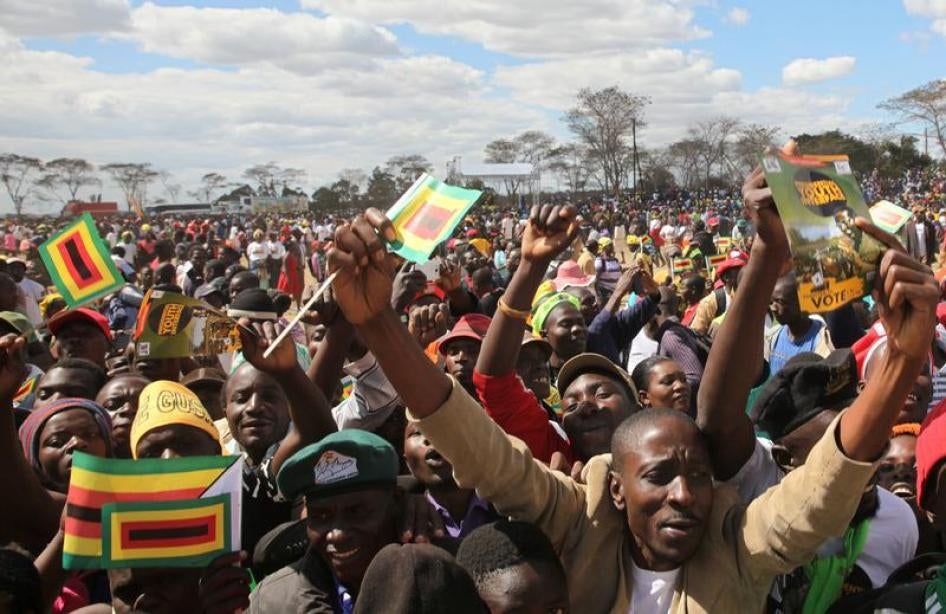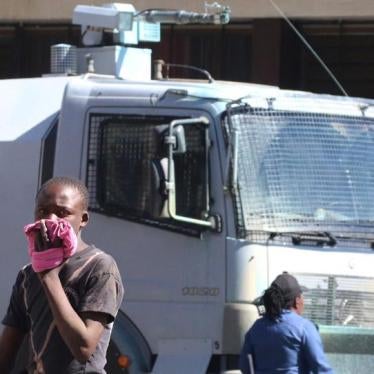Zanu PF has become riddled with factionalism and severely weakened by internal infighting over succession to Mugabe, who has led the party since 1977. Notwithstanding the endorsement, there is mounting pressure on Mugabe from different Zanu PF factions for him to name his successor. The party has increasingly relied on the security forces to confront political opposition within the party and externally. But the involvement of security forces in Zimbabwe’s political and electoral affairs could, as in the past, severely undermine the credibility of the elections and raise the risk of political violence within Zanu PF and across the country.
On July 27, while addressing the Zanu PF women’s league meeting, Mugabe said that the military should stay clear of politics, apparently responding to sections of the military that have aligned themselves with a faction pushing for him to step down. Zimbabwe’s civil authorities should make it clear that the involvement of security forces in political affairs is unacceptable at all times, not just when they align with a particular faction.
Zimbabwe’s state security forces, notably the military, have for several years interfered in the nation’s political and electoral affairs in ways that have adversely affected the ability of Zimbabwean citizens to vote freely. This was particularly evident during the 2008 elections when the army played a major role in widespread and systematic abuses that led to the killing of up to 200 people, the beating and torture of 5 000 more, and the displacement of 36 000. As with previous state-sponsored political violence, the authorities failed to hold those responsible accountable, entrenching impunity within the security forces.
The level of open political violence in the lead-up to the 2013 elections was markedly lower than 2008, but the risk of a resurgence in political violence remains high as the political structure that fuels violence remains intact. Since the 2008 political violence, the leadership of the military, police and CIO, all appointed by Mugabe, remain unchanged, as have their clear, public and vocal support for Mugabe and Zanu PF. The constitution of 2013 provides that no member of the security services may, in the exercise of their functions, act in a partisan manner or further the interests of any political party or cause. But this has never meant very much in practice.
The ruling party has actively employed other tactics aimed at intimidating or punishing opposition supporters ahead of the 2018 elections. Last August, the Zimbabwe Human Rights Commission — an independent constitutional commission created to curb the violation of human rights in Zimbabwe —published a report on food distribution, which concluded that there was, “discrimination and exclusion in the distribution of food aid” in several constituencies throughout the country along political lines. A 2017 policy brief by the Zimbabwe Peace Project corroborated this report, stating that it had recorded 355 “food violations” in 2016 relating to discrimination in the distribution of food aid along political lines. Both groups agree that these violations were committed in an attempt to punish dissent.
Urgent electoral reforms are needed to increase the likelihood of credible, free and fair elections next year. These include reforms to ensure the independence and enhance professionalism of the Zimbabwe Electoral Commission (ZEC), and updating the voters’ roll under ZEC’s exclusive control. Non-governmental groups, including human rights organisations, should be able to freely conduct voter education across the country. State media should give equal access to all political parties without bias or favour, and laws infringing on freedom of expression should be amended or revoked. The authorities should allow for the deployment of long-term domestic, regional and international election observers with unfettered access to all parts of the country.
Zimbabwe’s neighbours in the Southern African Development Community (Sadc) and the African Union should assist in preparing for credible, free, and fair elections. They should press Zimbabwe to ensure the political neutrality of the security forces and non-interference in the country’s civilian and electoral affairs. Zimbabwe is party to the Sadc principles and Guidelines Governing Democratic Elections established to promote regular free and fair, transparent, credible and peaceful democratic elections. Under the Sadc Principles, countries commit to take all necessary measures and precautions to prevent political violence, intolerance and intimidation.
Mugabe’s recent call for the security forces to steer clear of politics provides an opportunity for the Zimbabwe authorities to begin fundamental changes to end the military partisanship that has contributed heavily to the country’s disastrous human rights situation. Security sector reform is fundamental to the restoration of normality and respect for human rights, not just in Zanu PF political affairs, but also in the lives of ordinary Zimbabweans.









